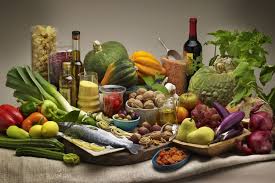Informative Articles
 The Mediterranean diet has long been hailed as healthy. But what exactly defines that diet and accounts for the benefits is still being worked out, researchers explained here.
The Mediterranean diet has long been hailed as healthy. But what exactly defines that diet and accounts for the benefits is still being worked out, researchers explained here.
A meta-analysis suggested "optimal" intake for the various food groups by averaging weighted medians from studies, which looked at health impacts of adherence to the dietary pattern traditional in countries like Italy, Greece, and Spain.
Those daily averages reported at the European Association for Cardiovascular Prevention and Rehabilitation's EuroPRevent meeting were:
-
Dairy products: 165 g for men and 200 g for women
-
Fruit: 140 g for men and 125 g for women
-
Vegetables: 125 g for men and 140 for women
-
Cereals: 130 g for men and 125 g for women
-
Meat: 70 g for men and women
-
Fish: 20 g for men and 25 g for women
-
Legumes: 10 g for men and women
"It's important to give specific indications," Francesco Sofi, MD, PhD, of the University of Florence, Italy, said in explaining the rationale for the study he presented at the conference.
The goal is to hone what has been used as an adherence score for research purposes into something clinicians could quickly use to assess diet quality at office visits and give a specific "prescription," for healthy eating, he told MedPage Today in an interview.
The meta-analysis pooled 41 prospective cohort studies in the primary prevention setting with a total of 2.9 million participants, which provided plenty of statistical power.
According to the cumulative analysis, a two-point increase of adherence score to Mediterranean diet showed a 9% reduction of overall mortality (hazard ratio 0.91, 95% CI 0.89 to 0.93), an 11% reduced risk of cardiovascular disease (HR 0.89, 95% CI 0.86 to 0.92) and a 5% reduction of neoplastic disease (HR 0.95, 95% CI 0.93 to 0.97).
However, Sofi pointed to the wide ranges in median intakes of the food groups reported across studies. For example, median vegetable intake came in at a low of 60 g per day in one study but a high of 540 g in another; for legumes, medians ranged from as little as 8 g a day to as much as 75 g.
The study didn't break out averages for all hallmarks of the Mediterranean diet, lacking, for example, data on olive oil, nuts, and wine.
And those are some of the most important components, Antonia Trichopoulou, MD, PhD, of the University of Athens and the World Health Organization Collaborating Center for Food and Nutrition Policies, noted in a separate session on the Mediterranean diet.
Her group had analyzed the relative contribution of the components of that diet to lower all-cause mortality in the Greek portion of the EPIC cohort study, reported in BMJ in 2009.
Through a subtractive statistical technique, the EPIC investigators calculated that the biggest chunk of the health advantage -- 24% -- came from moderate alcohol consumption (predominantly wine).
The other relative contributions were:
-
17% from low consumption of meat and meat products
-
16% from high vegetable consumption
-
11% from high fruit and nut consumption
-
11% from high monounsaturated-to-saturated lipid ratio (largely due to olive oil consumption)
-
10% from high legume consumption
"Over the years the emphasis has changed," Trichopoulou told attendees, noting that not only have Mediterranean countries progressively fallen off of their traditional diet, but the way they follow it has changed as well.
"In the 1960s, 40% of the energy intake [in Greece] was from lipids," she said. "They ate a lot of olive oil."
A recent randomized trial from Spain indicated a similar benefit from olive oil and from nuts in the Mediterranean diet for prevention of cardiovascular events in a high-risk population.
There are other cultural aspects too, like eating together and in small portions, Sofi noted, and those aren't well captured in studies.